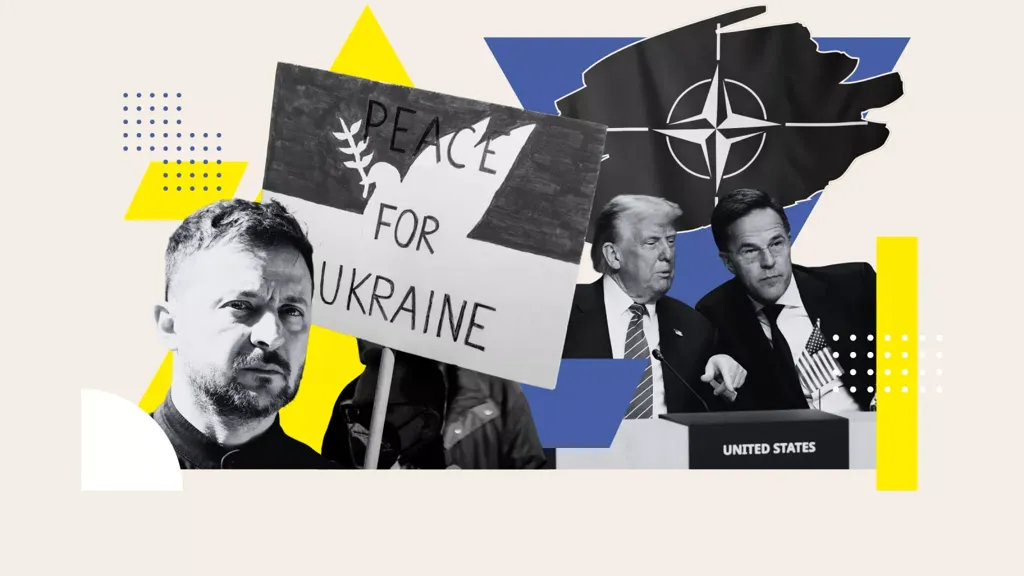President Donald Trump announced this week that the U.S. will send Patriot air-defense missiles to Ukraine and threatened new tariffs on Russia.
Will Vladimir Putin back down? What should Trump's next move be? And what does the future hold for Ukraine? Newsweek contributors Daniel R. DePetris and Dan Perry debate:
Daniel R. DePetris:
The Trump administration is betting that more U.S. military aid to Ukraine, coupled with additional sanctions in the form of secondary tariffs, will eventually compel Russian President Vladimir Putin to seriously negotiate a peace deal. This is precisely what the Biden administration believed too, and while U.S. support beefed up Kyiv's defenses, it did next to nothing to alter Putin's strategic calculations. Biden left office and passed the war over to Trump, who was highly reticent about continuing U.S. involvement. Trump believed Ukraine ultimately mattered more to Russia than it did to the United States. That was a correct assessment, and it's unlikely additional U.S. military assistance to Kyiv will change it in any way.
Dan Perry:
Trump's announcement signals that U.S. arms will keep flowing to Ukraine -- just indirectly. By routing weapons through NATO and shifting to sales instead of free transfers (which accounted for most aid under Biden), Trump maintains deniability with his MAGA base while turning a profit and forcing the Europeans to spend money. He seems to have concluded that Russia must still be resisted, however much he likes the dictator Putin personally. He'd be right. Putin isn't settling for Eastern Ukraine, which Trump's willing to hand over; Putin wants it all. Some red lines are still red, even for Trump.
DePetris:
I agree that this latest aid scheme is a relatively ingenious attempt by Trump to kill two birds with one stone: increase the pressure on Putin and make some hefty profits for U.S. defense contractors in the process. I also acknowledge Putin would like to gobble up all of Ukraine if he could. But intent is only as relevant as capability. If Putin doesn't possess the military capability to actually fulfill his wildest dreams -- and Russia's war performance to date provides little evidence that he does -- then it amounts to empty rhetoric.
Perry:
Well, Putin's desire to eliminate Ukraine as an independent state could still prolong the war, which Trump hates. Trump has actually changed his tune on the war here, while maintaining some deniability. Putin is being told -- with Trump's mafia-like rhetoric now directed at Moscow -- that Ukraine will not run out of arms. It is quite a big deal, to use language Trump will understand. More should come.
DePetris:
Sure, Trump is sending Putin a loud message. But how long will it last? Trump doesn't have a history of sticking to his policy decisions. Case in point: his latest policy decision on Ukraine, after months of putting more pressure on the Ukrainians than the Russians. While he seems to have flipped his position, there's a decent chance he could flip again. I suspect Putin understands this factor, and will account for it.
Perry:
You're right about Trump's flip-flops, but here's another way to look at it: Trump misjudged Putin's current position, but not his own. Imagine if Trump made this offer: Russia keeps the areas it captured thus far and wins amnesty and an end to sanctions, while Ukraine gets security guarantees without NATO membership and a fast track to the EU. Otherwise, 500 percent tariffs on whoever trades with Russia. Why not? He's said far crazier things, and coupled with the new weapons regime, it might just work.
DePetris:
Ultimately, this all comes down to Putin and Zelensky, not Trump. This conflict is a war of attrition, and the result will depend on the combatants' ability to sustain it. Putin's strategy is high-intensity, wasteful, and morally bankrupt, but he still has more lives to play with. I'm not sure there's anything, short of turning Ukraine's war into America's own -- which nobody is advocating for -- that will convince Putin to prioritize talking over fighting at this stage. That's the depressing reality.
Perry:
I have an alternate depressing reality: this war is already is America's -- or more correctly, the Western world's, which the U.S. once sought to lead. You'll agree there are times in history when you cannot run away. Now, I fear, is such a time. If Putin really wants more than Eastern Ukraine, it is time to lower the boom on this international outlaw. Let's hope the prospect of an endless supply of weapons for Ukraine, combined with serious punishment on the trade front, will do the trick.
DePetris:
At the risk of pretending I have a crystal ball, here's what I envision over the next few months: more U.S. weapons to Ukraine will help solidify Kyiv's defenses as the Russians press on with their counteroffensive. The Russians, in turn, will experience even more casualties, leading some in the U.S. media to speculate (yet again) that the war has reached a turning point. But those assessments repeatedly prove far too optimistic as Putin continues with the status quo because a defeat -- or even the perception of defeat -- is simply intolerable to his legacy and the country he represents. I'd be happy to be proven wrong.
Perry:
We agree on that! I'd also be happy to prove you wrong. And it may happen soon if Trump lays an ultimatum on the table, as I advised earlier. Let me just conclude with one lesson I have learned, both from history and from covering scores of countries, including Russia: no leadership is permanent. Dictatorships seem invulnerable, and then one day they're gone. People speak of the Russian "system" behind Putin and sure, there is one. But it can be shape-shifting and deceptive, and Putin is a singular leader. Russia has taken many forms in the past century alone. And Putin, too, shall pass.
